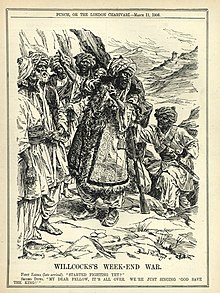| Bazar Valley campaign | |||||||
|---|---|---|---|---|---|---|---|
| Part of Instability on the North-West Frontier | |||||||
 Punch Magazine cartoon - "Wilcock's Weekend War" | |||||||
| |||||||
| Belligerents | |||||||
|
| Zakka Khel clan of the Afridi | ||||||
| Commanders and leaders | |||||||
| James Willcocks |
| ||||||
| Strength | |||||||
| Unknown | 6,000 (British estimate)[1] | ||||||
| Casualties and losses | |||||||
|
Officers: 1 killed, 4 wounded Others: 2 killed, 33 wounded | 70 or more killed, 70 or more wounded | ||||||
The Bazar Valley campaign of 1908[2] was a punitive expedition against the Zakka Khel clan of the Afridi, a Pakhtun tribe inhabiting the mountains on the Peshawar border of the North West Frontier province of British India.[3]
It was undertaken by the Bazar Valley Field Force, under the command of General Sir James Willcocks. The campaign began on 12 February 1908, and was concluded by a jirga and peace in March 1908. The satirical magazine Punch characterised the campaign as Willcocks’ Weekend War.[4] The main British Army elements were the Seaforth Highlanders and the 37th Lancers. Regiments of the British Indian Army included sections of the 45th and 53rd Sikhs, the Madras Sappers and 5 Gorkha Rifles. Archibald Percival, 1st Earl Wavell took part in this campaign as a junior officer.[5]
- ^ Cite error: The named reference
:0was invoked but never defined (see the help page). - ^ Official account of the Bazar Field Force, a punitive expedition against the Zakka Khel Afridis in February/March 1908, led by Major-General Sir James Willcocks Archived 28 May 2009 at the Wayback Machine Author: Intelligence Branch Amy Headquarters India ISBN 978-1-84574-360-4
- ^ "INDIA—NORTH-WEST FRONTIER POLICY. (Hansard, 26 February 1908)". Parliamentary Debates (Hansard). 26 February 1908. Retrieved 1 June 2013.
- ^ "Field Operation - Zakka Khel, 1908. Bazar Valley Field Force. (1908)". Maggs.com. Retrieved 1 June 2013.
- ^ "AIM25 collection description". Aim25.ac.uk. Retrieved 1 June 2013.